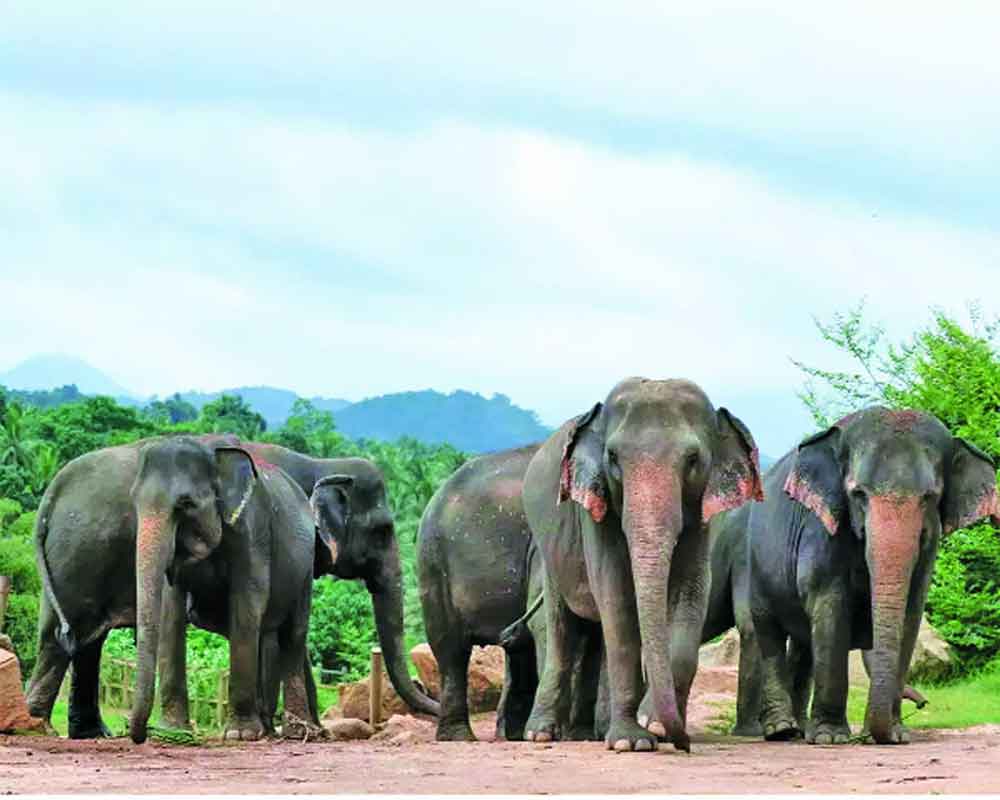The curious case of Janumani's release into freedom after 20 years in captivity and the darkness of the shadow under the lamp
On August 11, 2002, a day before the annual World Elephant Day, Janumani, an elephant kept captive at a spice farm in Goa for nearly 20 years, walked away to freedom following an order by a bench comprising Justices M.S. Sonak and RN Laddha of the Bombay High Court at Goa. The bench, in its order, passed on July 18, 2022, permitted Janumani to be transported to Karnataka State Forest Department's Elephant Care Centre, and declared that 'we will appreciate if the Forest Department officials act with utmost despatch so that there is no delay in the matter.' Janumani's release into freedom was supervised by Goa forest department officials led by the state's chief wildlife warden, Santosh Kumar. Assisting in the process was Alok His warwala Gupta, a representative of the Wildlife Rescue and Rehabilitation Centre (WRRC) a sister organization of Compassion Unlimited Plus Action (CUPA), an animal welfare organization based in Bengaluru.
Another of the Indian Judiciary's excellent orders in cases involving animals, this one came in the wake of the legal battle waged before the Bombay High Court at Goa by People for Animals (PFA), Goa, a non-profit organization whose president is Norma Alvares. The process began with a PIL lodged in the Bombay High Court at Goa in January 2020, by the PFA following reports of continuing commercial use of the elephants at two of the three spice farms from which the Janumani was rescued.
As written by Norma Alvares and Alok Hiswarwala Gupta in an article in the OHeraldO, Goa, dated August 14, 2022, and titled "'Janumani' walks away to freedom," the recently-released elephant had a horrible life in captivity.A wild elephant, captured from Assam's forest, she was taken to the notorious animal fair in Sonepur, Bihar, and from there to Goa in 2005. There, for 17 years, she lived mostly tied to a tree under a tarpaulin, just outside the spice farm, acting as a source of amusement for tourists.
Occasionally, she was taken to Karnataka, Maharashtra, and Ayyappa temple in Vasco, Goa, for participation in temple rituals, in jolting trucks, or on foot without food or water. She was also taken to beach weddings. All this was utter misery for her. Elephants are social animals who live in closely-knit herds bound together by deep mutually caring and loving ties. They live in, and regularly travel over, wide-open spaces inside or at the edge of forests. They have long memories and she must have been frequently haunted by those of her days in freedom.
Janumani is not the only elephant to have suffered thus. She was one of the 12 elephants held in three spice farms in Goa's Ponda taluka. Following a PIL on captive elephants filed in the High Court of Bombay at Goa in 2018 alleging that they were kept in illegal captivity and used for commercial activity without any sanction from the Animal Welfare Board of India (AWBI), the respondent spice farms were compelled to provide an undertaking that the elephants they possessed would not be used to entertain tourists thereafter.
The PIL, however, had spurred the Goa forest department to investigate whether the spice farms had ownership documents for these elephants and, finding none, ordered, in December 2018, the seizure of all elephants with private owners. They had also filed a case against the owners for illegal possession of these animals in the court of the Joint Magistrate First Class (JMFC) in Ponda. The elephants, however, continued to remain with the spice farms as the Goa forest department has no facility to house them.
Many elephants continue to suffer in captivity because India has only four dedicated captive elephant rescue centers and they are full. Unfortunately, this should happen despite the Wildlife Protection Act of 1972 which puts elephants in Schedule I of protected species, and Project Elephant launched by the Government of India's Ministry of Environment and Forests in 1992. The project is meant to ensure the long-term survival of Asian elephants-the category to which Indian elephants belong-by providing technical and financial support to States for efforts to ensure the long-term survival of the behemoths by protecting their habitats and migration corridors.
It is crime to capture them, separate them from their herds, bring them to urban deserts and condemn them to solitary lives in which they are worked to the ground, poorly fed and hardly cared for. Yet humans have been doing precisely this for centuries, as they have been killing them for the ivory of their tusks or hunting them for the perverse thrill of it, or imprisoning them in the concentration camps for wildlife known as zoos.
An important cause of their suffering in contemporary India is their being perhaps the only wildlife species that can be privately owned. This must end, as most private owners ill-treat and exploit them horribly. Unfortunately, instead of ensuring this, a move is afoot to permit their commercial trading, which is forbidden now, through a legislative amendment. The process must be reversed. Elephants, designated India's National Heritage Animal and species kin to Airavata, the white elephant that is the vahana (carrier) of Lord Indra, the King of Deities, deserve better.
(The author is Consulting Editor, The Pioneer. The views expressed are personal.)
























